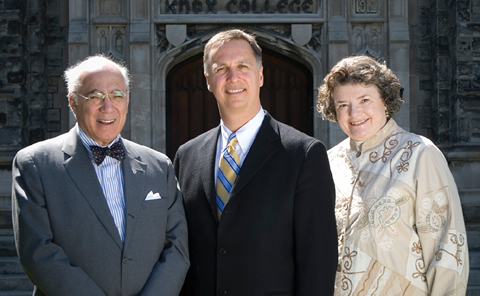How U of T manages its two rapidly growing east and west campuses will be a central issue for members of the university’s Governing Council when it reconvenes this fall.
The council’s September meeting will be the first for several new governors, including Nykolaj Kuryluk, one of three alumni representatives elected in the spring. Maureen Somerville, who has served on council since 2004, was re-elected. And professor emeritus Michael Marrus, who was previously a faculty governor, will continue his long service as an alumni governor.
The representatives will likely find U of T’s governing structure at the top of the agenda. Marrus, who is a member of the task force examining governance, says the university’s current system of governance wasn’t set up to handle Scarborough and Mississauga at their current sizes. With 10,000 students each, the campuses are several times larger than when the system was established almost 40 years ago.
“There is a lot of duplication in Governing Council, and there is a lot of time devoted to transactional matters while strategic issues are not given so much attention,” says Marrus (BA 1963 UC, MSL 2005). He notes that the task force will deliver a report in late June, recommending governance changes for the east and west campuses. “Exactly how we’re going to sort this out I don’t know. It’s not the job of governors to manage the university. But it is the job of governors to ensure that the university is well managed.”
Somerville (BA 1969 UTSC, BEd 1970 OISE) can appreciate the scope of the challenge. She attended U of T Scarborough in the late 1960s, and agrees that the pace of expansion at east and west campuses needs to be addressed. Somerville, who taught high school English and drama for almost 30 years, is also concerned with representation on council itself. “When you look at the governors, only two of eight alumni governors are female and the rest are white males and I think this imbalance needs to be addressed,” she says, adding that this is not the fault of the college of electors. “Perhaps there needs to be an open discussion about how we can get alumni governors who better reflect today’s U of T community.”
Nykolaj Kuryluk (BSc 1989 UTM), the only alumni representative new to Governing Council this year, is director of the strategy and program management office for Amgen Canada – a biotechnology company based in Mississauga. Kuryluk’s expertise lies in strategic planning, new product commercialization and change management. He believes the university’s biggest challenge over the next decade will be to remain a worldwide leader in research – especially in the wake of the global economic meltdown – while continuing to offer a superior student experience. Doing so, he says, will require “state-of-the-art infrastructure” in order to recruit and retain the best faculty, as well as innovative program development. “Unique programs will give the university, its students and future employers a competitive advantage,” he says.
However, research and program development require money, and funding is a perennial issue for U of T. “The university has financial problems that have affected virtually every division,” says Marrus. Because U of T receives the majority of its funding from the province and from fees, which are regulated, it does not have much scope to raise revenues. “What we can do is to make sure that we have the best relations with government and that we oversee our endowment and investments properly,” says Marrus. “I certainly don’t have any rabbits to pull out of the hat.”
Recent Posts
U of T’s 197th Birthday Quiz
Test your knowledge of all things U of T in honour of the university’s 197th anniversary on March 15!
Are Cold Plunges Good for You?
Research suggests they are, in three ways
Work Has Changed. So Have the Qualities of Good Leadership
Rapid shifts in everything from technology to employee expectations are pressuring leaders to constantly adapt






